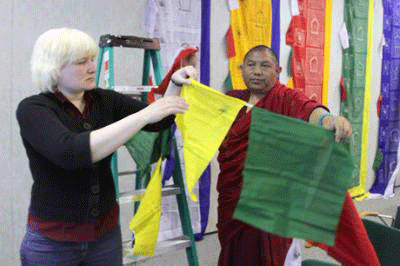
Dressed in the red robes of a monk, surrounded by colourful Tibetan prayer flags, Venerable Geshe Thupten Dorjee was at home speaking about the most complicated tenets of Tibetan Buddhism or telling stories about his students at the University of Arkansas or the University of Northern Iowa.
Geshe-La visited the Kerry Wood Nature Centre on Sunday to talk about Tibetan culture, non-violence in the 21st Century and some of the projects he has worked on to help support Tibetans who are in exile from their country.
Geshe-La was born in Tibet during the Chinese Communist invasion of 1959, with his family later escaping to Bhutan.
By age 13, he entered the Drepung Loseling Monastery in Karnataka in southern India, eventually receiving the Lharampa Geshe, the highest academic degree within the Gelug monastic university system, and then later the Ngarampa Geshe degree from Gyuto Tantric University in Dharamsala, India.
Since the fall of 2006, he has taught Tibetan culture, Buddhist philosophy and the principles of non-violence at the University of Arkansas’ Fulbright College of Arts and Sciences.
He also teaches at the University of Northern Iowa.
Geshe-La said that no matter what situation a person is living in they can live in peace and harmony.
He said a person may look around and feel the world is damaged, their life is damaged, their relationship, house or even culture may be damaged, but none of it matters.
He said it is all about how someone feels on the inside and how they react to the situation. “You can remain in peace. It doesn’t matter what circumstances you are in,” he said.
He said the philosophy can be a difficult one for North Americans to understand.
“North Americans live in a materialistic world. Everything that matters is how much you’ve got of money, everything matters if you have a big house or not a big house.
Yes, it’s important we need those things, but at the same time you need to remember those are resources that are conditional, not primary sources. The primary sources (of happiness) are inside,” he said.
Geshe-La takes some of his students on a trip to speak with Tibetans in exile in India most years and during the trip sees how the students’ perspective changes.
The students will travel in buses with monkeys jumping over the top of the vehicle and when they stop for a bathroom break they’ll have to use a leaf instead of toilet paper.
But at the same time he said the students see that although the people they meet live modestly it is obvious how happy they are.
Around 20 people took part in the event on Sunday, with money raised from the $50 admission going to an orphanage and other projects to help Tibetan people.
More information on the orphanage is available at www.warithangorphanage.com.
June Thompson, one of the organizers of the Sunday event, said originally they were going to have a small seminar on Tibetan culture, but then found out Geshe-La could come for the day.
[…]
“It’s fabulous. We are very blessed. It’s a wonderful opportunity,” Thompson said.
Thompson has helped to organize the third annual Tibetan dinner, set for June 20, at the Valley Centre Hall, along Hwy 595.
Tickets will be $25 and with include authentic Tibetan food, a Tibetan bazaar, dancing and singing.
Money raised will go to a Tibetan orphanage and in addition they hope to raise money for Tibetan earthquake victims.
More information and tickets are available from Thompson at 403-342-6725.
Author : Stacy O’Brien
Source : http://www.albertalocalnews.com




